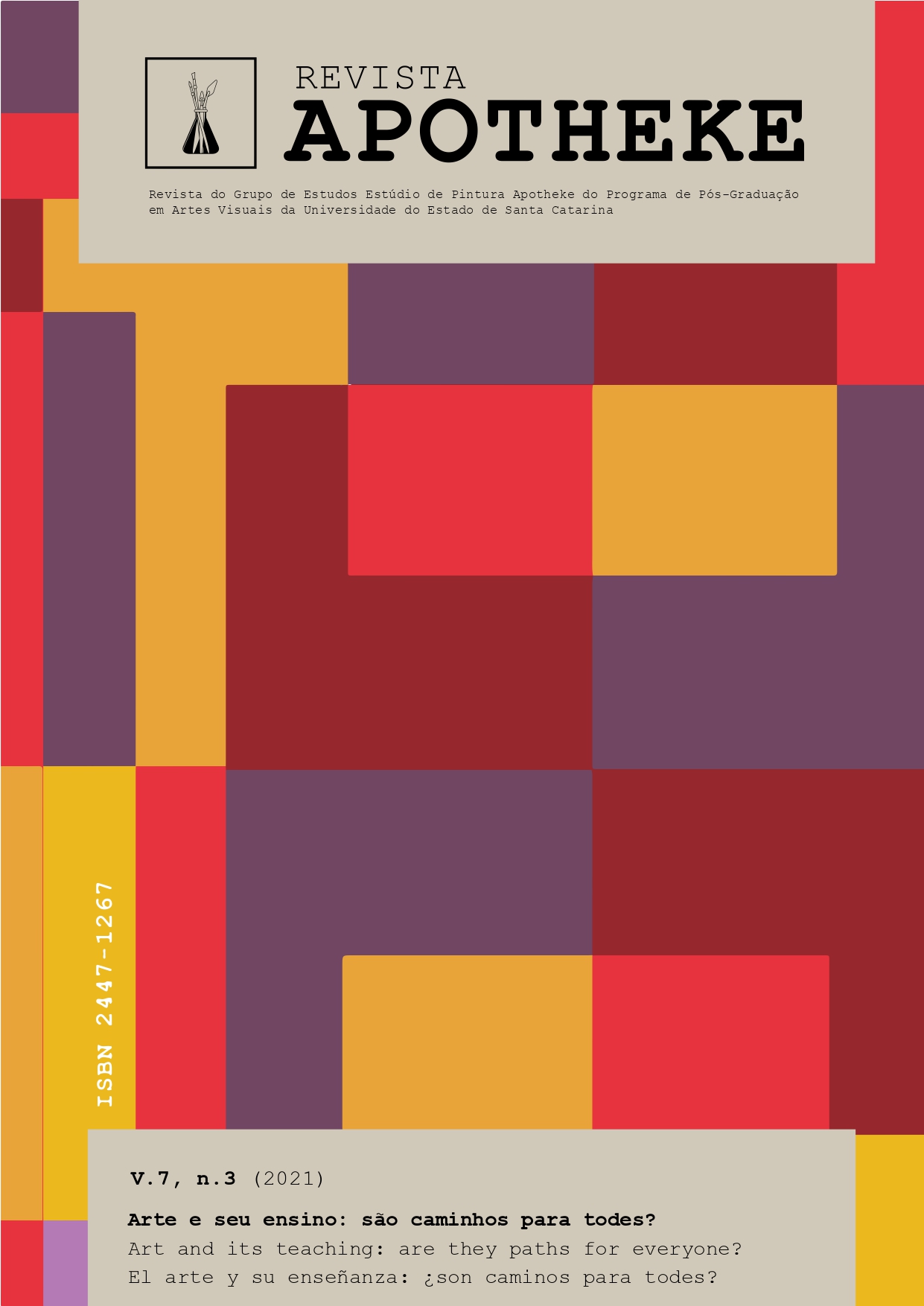Power relations and art education: body/memory as a subversive force in postmodernity
DOI:
https://doi.org/10.5965/24471267732021036Keywords:
Arte-educação, poder, memória, pós-modernidadeAbstract
The power regimes imbricated in the profusion of images in the contemporary scenario end up requiring a more active posture on the part of art educators in the sense of reclaiming their sayings and tensioning their discourses. Therefore, memory and the body emerge as opportune instances to erase the essentialisms inherited from modernity, highlighting other ways of re-signifying the transit of meanings from the many rationalities that coexist in the symbolic field. Thus, I propose an epistemological analysis of power-knowledge, body and memory, aiming to contribute to problematizations around the role of art education in post-modern society.
Downloads
References
BARBOSA, A. M. A imagem no ensino de arte: anos 1980 e os novos tempos. São Paulo: Perspectiva, 2014.
BARBOSA, A. M. Uma introdução à arte/educação contemporânea. In: BARBOSA, A. M. Arte/educação contemporânea: consonâncias internacionais. São Paulo: Cortez, 2010, p. 11-24.
BAUMAN, Z. Modernidade líquida. Rio de Janeiro: Zahar, 2001.
BERGSON, H. Matéria e memória: ensaio sobre a relação do corpo com o espírito. São Paulo: WMF Martins fontes, 2021.
BERGSON, H. Memória e vida. São Paulo: WMF Martins fontes, 2019.
BOSI, E. O tempo vivo da memória: ensaios de psicologia social. São Paulo: Ateliê Editorial, 2003.
BUTLER, J. A vida psíquica do poder: teorias da sujeição. Belo Horizonte: Autêntica, 2020.
CONNERTON, P. Como as sociedades recordam. Oeiras: Ed. Celta, 1999.
DELEUZE, G. Bergsonismo. São Paulo: Editora 34, 2012.
DEWEY, J. Arte como experiência. São Paulo: Martins Fontes, 2010.
DREYFUS, H. L.; RABINOW, P. Michel Foucault, uma trajetória filosófica: para além do estruturalismo e da hermenêutica. Rio de Janeiro: Forense Universitária, 1995.
FOUCAULT, M. História da sexualidade: A vontade de saber. Rio de Janeiro: Edições Graal, 1988. v. 1.
FOUCAULT, M. Microfísica do poder. São Paulo: Paz e Terra, 2021.
FOUCAULT, M. Vigiar e punir: nascimento da prisão. Petrópolis: Vozes, 2014.
GREINER, C. O corpo em crise: novas pistas e o curto-circuito das representações. São Paulo: Annablume, 2010.
HAESBAERT, R. Território e descolonialidade: sobre o giro (multi) territorial/ de(s)colonial na América Latina. Ciudad Autónoma de Buenos Aires: CLACSO; Niterói: Programa de Pós-graduação em Geografia: UFF, 2021. Disponível em http://biblioteca.clacso.edu.ar/clacso/se/20210219014514/Territorio-decolonialidade.pdf acesso em 08 ago. 2021.
HOFFMAN, M. O poder disciplinar. In: TAYLOR, D. (org.). Michel Foucault: conceitos fundamentais. Petrópolis: Vozes, 2018, p. 41-57.
HOOKS, B. A língua: ensinando novos mundos/novas palavras. In: HOOKS, B (org.). Ensinando a transgredir: a educação como prática de liberdade. São Paulo: Martins e Fontes, 2013, p. 223-234.
JAMESON, F. Pós-modernismo: a lógica cultural do capitalismo tardio. São Paulo: Ática, 2000.
MAFFESOLI, M. Notas sobre a pós-modernidade: o lugar faz o elo. Rio de Janeiro: Atlântica Ed., 2004.
MOREIRA, J. A. S. O corpo jovem como território e o uniforme escolar como fronteira: o poder velado e suas territorialidades. In: MAIA, C. E. S. et al. (orgs.). Corpos cobertos desnudando espacialidades: vestimenta, roupa, traje, fantasia e moda na geografia. Jundiaí: Paco Editorial, 2021, p. 79-110.
ROSSI, A. A arquitetura da cidade. São Paulo: Martins e Fontes, 2001.
TAYLOR, C. Biopoder. In: TAYLOR, D. (org.). Michel Foucault: conceitos fundamentais. Petrópolis: Vozes, 2018, p. 58-75.
VEIGA-NETO, A; SARAIVA, K. Educar como arte de governar. Currículo sem Fronteiras, v.11, n.1, Jan/Jun 2011, p. 5-13. Disponível em https://biblat.unam.mx/hevila/CurriculosemFronteiras/2011/vol11/no1/1.pdf acesso em 09 ago. 2021.
WILSON, B; WILSON, M. Uma visão iconoclasta das fontes de imagem nos desenhos de crianças. In: BARBOSA, A. M. Arte-educação: leituras no subsolo. São Paulo: Cortez, 2005, p. 59-78.
Downloads
Published
How to Cite
Issue
Section
License
Copyright (c) 2022 Roney Gusmão

This work is licensed under a Creative Commons Attribution-NonCommercial 4.0 International License.
Copyright and Licensing Policy
Authors of works submitted to Revista APOTHEKE authorize their publication in both print and digital formats exclusively for academic purposes. Reproduction is permitted, provided that the source is properly cited. Authors confirm the originality, authorship, and unpublished status of their manuscripts.
Articles published by the journal are freely available and intended for academic and non-commercial use only. All copyrights are transferred to the journal. The content of signed articles reflects the views of their respective authors and not the official position of Revista Apotheke. The author(s) agree to always cite the following reference when republishing or referring to the content originally published in Revista Apotheke:
“This article was originally published by Revista Apotheke in volume (insert volume), number (insert number), year (insert year), and is available at: http://www.revistas.udesc.br/index.php/APOTHEKE/index”
It is the sole responsibility of the authors to obtain written permission for the use of any material protected by copyright law included in their articles. Revista Apotheke is not responsible for copyright infringements committed by contributors.
Authors retain copyright and grant the journal the right of first publication, with the work licensed under a Creative Commons Attribution-NonCommercial License (CC BY-NC):
-
Attribution (BY): Licensees are allowed to copy, distribute, display, perform, and create derivative works, provided that proper credit is given to the author or licensor, in the manner specified.
-
NonCommercial (NC): Licensees may use the material only for non-commercial purposes.
After publication, authors retain the rights to their work and may republish the text.



